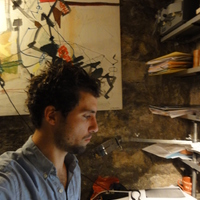Thibaud Trochu
Université de Lille, Philosophie, Faculty Member
- Philosophy, Psychology, Psychoanalysis, History of Science, Continental Philosophy, History of Medicine, and 16 moreAbnormal Psychology, Pragmatism, Psychology of Religion, Altered States of Consciousness, History of Psychiatry, History Of Psychology, William James, American Philosophy, Psychology of Unconscious, Psychoanalysis and religion, Mathematical Psychology, Philosophy of Psychopathology, Theories Of Psychotherapy, Anomalistic Psychology, Charles S. Peirce, and History Of Madness And Psychiatryedit
Research Interests:
Research Interests:
Research Interests:
While browsing among the archival data that remain in the James Collection at Houghton Library and especially regarding the remains of "William James's Philosophical Library", it becomes clear that William James was a very active reader.... more
While browsing among the archival data that remain in the James Collection at Houghton Library and especially regarding the remains of "William James's Philosophical Library", it becomes clear that William James was a very active reader. Among the various fields which stirred his interests, possibly the most striking, as shown by the huge amount of documents, is the field covering such topics as abnormal psychology related to religious experiences, from the most serious monograph in German psychiatry to fly-by-night psychic publications. Can an exploration of these documents help scholars understand how James built up The Varieties of Religious Experience? Is it possible to consider these materials as scaffolding that remain behind the scene of his published writings? So, we interviewed a scholar who investigated for years into this material in order to collect some insights about James's sources, about the philosopher's work in the privacy of his own study
Research Interests:
« L’éducation (re)-saisie par les sciences. L’applicationnisme et ses enjeux ». Université de Tours, 12-13 juin 2019.
Research Interests:
Research Interests:
« Une histoire de la psychologie par les femmes ? ». Le groupe d’études pluridisciplinaires d’histoire de la psychologie (GEPHP), en partenariat avec le séminaire « Psychologie, psychiatrie, psychanalyse : histoires croisées » (EHESS),... more
« Une histoire de la psychologie par les femmes ? ». Le groupe d’études pluridisciplinaires d’histoire de la psychologie (GEPHP), en partenariat avec le séminaire « Psychologie, psychiatrie, psychanalyse : histoires croisées » (EHESS), propose d’aborder cette question lors d’une après-midi d’étude au Centre Alexandre-Koyré le vendredi 13 avril 2018.
Des chercheuses et des chercheurs, jeunes et confirmés, y présenteront et questionneront certains discours savants, médicaux et philosophiques sur les femmes depuis le XIXe siècle, la dimension sociale et normative de certaines catégories psychiatriques construites sur les attributs supposés de la féminité, un club de réflexion féminin sur la psychanalyse dans l’entre-deux-guerres, les carrières, pratiques et représentations des premières femmes médecins en Europe et une psychologie différentielle des filles et des garçons conçue d’après une spécialiste de l’enfance et de l’adolescence.
Autant de prises sur la question posée qui visent à interroger le grand récit masculinisé de l’histoire des sciences psys, des torsions et des silences qui en découlent.
Des chercheuses et des chercheurs, jeunes et confirmés, y présenteront et questionneront certains discours savants, médicaux et philosophiques sur les femmes depuis le XIXe siècle, la dimension sociale et normative de certaines catégories psychiatriques construites sur les attributs supposés de la féminité, un club de réflexion féminin sur la psychanalyse dans l’entre-deux-guerres, les carrières, pratiques et représentations des premières femmes médecins en Europe et une psychologie différentielle des filles et des garçons conçue d’après une spécialiste de l’enfance et de l’adolescence.
Autant de prises sur la question posée qui visent à interroger le grand récit masculinisé de l’histoire des sciences psys, des torsions et des silences qui en découlent.
« Le subconscient aux commandes », conférence / exposition du Musée de la Main de Lausanne (« La conscience sous contrôle. Les psys peuvent-ils réellement effacer vos souvenirs et guider vos pensées ?... »), UNIL / Institut des Humanités en Médecine. (Org.Rémy Amouroux, Aude Fauvel), (février 2018)more
« On Some Unknown Historical Aspects of the British Society for Psychical Research’s foundation: A Controversy with Dr. George Miller Beard », International Colloquium on « Psychical Research in the History of Medicine and Sciences » (Org. S. Shamdasani), University College London (Janvier 2013)more
« Regards croisés sur les ‘créations somnambuliques’ d’Hélène Smith, ou l’état de transe comme condition d’une esthétique du bizarre », Colloque UNILausanne, « le Théâtre des nerfs : cultures neurologiques, psychologiques et spectaculaires autour de 1900 » (org. V. Barras, M. Berton, C. Eidenbenz),more
